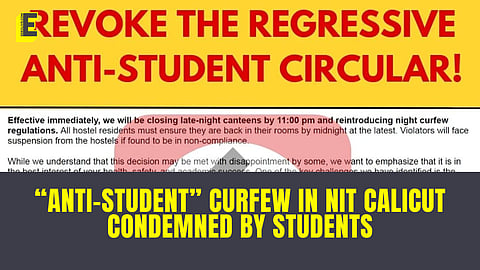

In a move that has left students of NIT Calicut in a tizzy, the administration has enforced a curfew on campus by announcing the closure of late-night canteens by 11:00 pm. In a notice issued on March 20, the Dean of Student Welfare directed all students to ensure they return to their dorm rooms by midnight, failure to comply resulting in suspension.
While acknowledging the disappointment this move could potentially cause to some students, the circular still justifies it citing concerns for students' health, safety, and academic success.
In the circular, the Dean of Student Welfare emphasised that the late-night canteens have prompted students to engage in late-night snacking, thus leading to “unhealthy food choices” that contribute to “poor dietary habits” that adversely impact their overall health.
The circular also highlighted concerns regarding “late-night outings” suggesting that it risks and vices, such as smoking, alcohol consumption, and substance abuse. Moreover, the notice also claims that disturbances in students’ sleep patterns take a toll on their physical and mental health.
Despite the administration’s reasoning, some students have voiced objections to the decision, demanding its revocation.
Why are students opposing this?
In a unified statement posted on Instagram, the NIT Calicut students vehemently condemned the circular and termed it ‘anti-student’. The statement challenges the basis on which certain claims were made and demands transparency regarding the decision-making process.
The statement questioned the evidence upon which concerns about the impact of late-night canteen operations on students' eating habits were founded. Furthermore, it challenges the rationale behind imposing a curfew, citing reasons such as substance abuse, alcohol consumption, smoking, and sleep deprivation.
“Doesn’t accusing students of substance abuse without adequate evidence constitute an act of defamation?”, challenge the students, asserting that absence of evidence leads to students to believe that the order is merely an attempt to restrict their freedom.
Moreover, the students criticise the lack of a Student Body Meeting before the imposition of the curfew, emphasising the importance of involving students in decisions that directly affect campus life. They argue that the abrupt closure of facilities by 11:00 pm poses challenges for research scholars accustomed to more flexible working hours.
Is the curfew an act of retribution?
The students’ statement highlighted several pressing concerns, beginning with the lack of action taken against individuals involved in the assault on Vysakh Premkumar, a Dalit BTech student who protested the consecration of the Ram Janmabhoomi temple in Ayodhya. Notably, Vysakh was suspended by the Dean of Student Welfare following the incident, sparking widespread protests on campus, and resulting in the suspension being temporarily halted.
Furthermore, the students also sought action against Prof Shyja Andavam for allegedly praising Nathuram Godse, the man who assassinated Gandhi. “Does her shocking impunity mean that the admin is supportive of this opinion?”, they ask.
The students also criticised the administration’s decision to ban regional newspapers on campus, viewing it as an infringement on their access to information.
According to the students, the recently imposed curfew is perceived as an act of retribution against the student community for their protests against Vysakh’s suspension. They argue that this move reflects a punitive approach rather than a genuine concern for student welfare.
